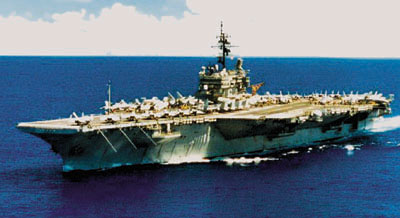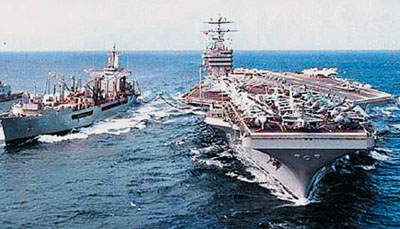 Lion awakening
Lion awakeningChina seen as a newborn power
By Sophia Yow
With a quarter of the world's population at its command, China, though still a developing country, is a sovereign power to be wary of, some analysts say.
Prof. Robert Ross of Harvard University, an expert in Sino-American relations, suggests two ways to interpret the well-known "China threat" theory. The optimistic view is "the prospect of China to develop sufficient power to challenge the existing balance of power".
The pessimistic view is "its ability to develop dominance as it becomes more powerful".
According to Prof. Ross, the origin of the theory is based on three observations: the strong growth of the Chinese economy, the boost of its defence budget and its large population.
However, Mr. Lau Yui Siu, a local political commentator, believes the main concern is that "China is powerful and at the same time, irrational.
"There is no fear if China acts sensibly," said he.
Dr. Lau Siu-kai, associate director of the Hong Kong Institute of Asia-Pacific Studies, said that the difference in political systems between China and the West is also a factor in the equation.
"China is not a democratic country," he said, "so there is no balancing force to stop the so-called dictator from raising a war against other countries."
Racial and cultural differences are other causes, according to Dr. Lau.
Whatever the reasons, however, other observers say there is no basis for the theory.
Mr. Wang Shao-guang, an associate professor specialising in public finance at Yale University, said people proposing the theory "do not understand China and its military forces".
He said that those who uphold this theory might have compared the Chinese defence budget in 1989 with the present one. However, the correct reference point should be 1978.
From figures in the China Statistical Yearbook 1995, published by the State Statistical Bureau of China, there was small percentage increase in the defence expenses from the mid-'70s to 1988.
The only dramatic increase was in 1979, when China had a war with Vietnam. Since 1989, however, the budget has shot up about 15 percent each year and reached a peak of 29 percent in 1994.
However, since the economic reforms in the early '80s, the inflation rate has remained high. Sometimes it was higher than 10 percent.
"If the inflation rate is taken into consideration, the actual defence expenditure in 1989 was only 75 percent of that of 1978, while 1993 is roughly the same as 1978," said Prof. Wang.
In order to project power into a region, a country must have enough aircraft to cover the area continually. But at this time the Chinese navy has no aircraft carriers, though the People's Liberation Army is said to be constructing one.
According to Prof. Ross, the Pentagon estimates the first generation Chinese aircraft carriers will be about 45,000 tons displacement, only half the size of their U.S. counterparts.
This has two implications. One is that a Chinese carrier will be able to carry only 40 combat aircraft, less than half the number of a U.S. carrier. The other is that only less powerful aircraft will be able to take off from the shorter flight deck. Actually, this suits China's present level of technology, because at this time China cannot manufacture the extremely powerful engines needed for advanced aircraft.
Thus Prof. Ross said, "The idea that aircraft on a 45,000-ton aircraft carrier can defeat American F-15s or F-16s is simply not realistic.
"In a real war, the U.S. has three carriers available to remain at the location all the time: one goes to port, one gets repaired, and one is ready to attack. Otherwise the (ground) soldiers are vulnerable to be attacked by their enemies. It will take China at least 20 years to build three carriers."
Meanwhile, political commentator Lau Yui Siu said that Chinese weapons are too weak to threaten other countries.
"People say China has nuclear power, but the technology is used to generate electricity more than to make nuclear weapons," said Mr. Lau.
He also pointed out that Chinese combat aircraft are not sufficient for war.
"Their best combat aircraft, the J-8s, have functions equivalent only to that of the (old Soviet) SU-16s, while the latest SU-27s have been invented already. China has bought only one or two SU-27s."
During the dispute over the Spratly Islands, or Nan Sha, in the early '80s, China was unable to raise a war against the Philippines, Malaysia and Brunei.
"This was because their best fighters would have had no fuel by the time they reached the Islands," Mr. Lau said.
Though some may argue that China will catch up, Prof. Ross said it could not purchase enough strategic weapons and related matériel.
"No one will sell ammunition to China to make it a world power, nor can it develop the technology itself. At present, only the U.S. and Japan have technological standards which are high enough," he said.
Besides, the Chinese Government is facing a number of political and economic problems. It needs a peaceful environment to deal with them.
Mr. Man Cheuk Fei, editor of political commentary for the Hong Kong Economic Journal, said, "The Chinese Government is preoccupied with these problems and has no intention or resources to threaten other countries."
Moreover, Prof. Ross said that China needs a peaceful environment for economic growth and to catch up in the race of security technology.
 That was why China has had few conflicts with other countries in the past decade.
For example, China in the Spratly dispute negotiated with the Philippines, Malaysia and Brunei to develop the islands together.
That was why China has had few conflicts with other countries in the past decade.
For example, China in the Spratly dispute negotiated with the Philippines, Malaysia and Brunei to develop the islands together.
It recently agreed with the Japanese government to put the recent Diaoyu conflict aside.
The only exception was the Taiwan Strait manoeuvres.
"The Chinese government views this as domestic affair, resulting in a different attitude," said Mr. Man.
Finally Prof. Ross said: "It (China) wants the power, and this is the only thing to be expected. But there will be no 'China threat' in the coming 25 to 30 years."
| China | United States | |
|---|---|---|
| Aircraft carriers | 0 | 12 |
| Total number of aircraft on board | 0 | over 1,010 |
| Cruisers | 0 | 32 |
| Destroyers | 18 | 46 |
| Frigates | 32 | 49 |
| Submarines | 52 | 100 |
| Amphibious ships | 54 | 41 |
| Intercontinental ballistic missiles | some17 | 597 |

January 1997
Return to contents
